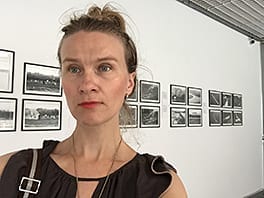 Asta Zelenkauskaite is an assistant professor of Communications at Drexel University. She received a 2016 AABS Emerging Scholar award for research travel to Lithuania for her project “Commenting Practices in Baltic Online News Portals.”
Asta Zelenkauskaite is an assistant professor of Communications at Drexel University. She received a 2016 AABS Emerging Scholar award for research travel to Lithuania for her project “Commenting Practices in Baltic Online News Portals.”
Online news portals increasingly represent spaces where anyone can comment on traditional news stories. Thus online commenting is not only a new public sphere, but it is also a new terrain for ideological battles to shape opinions regarding specific issues (especially controversial ones) through government-sponsored mechanisms or by providing monetary rewards to users for commenting.
First and foremost, the Emerging Scholar grant allowed me to visit Lithuania and engage with readers of news portals to understand the interpretation of online commenting on news portals. This grant has helped me to validate initial observations regarding data collection through informal interviews with Lithuanians who are actually engaging in online discussions or reading them. While travelling in Lithuania, I had a chance to talk to the people who use online comments – as a source of additional reflection on the news articles.
In the practical sense, this grant has helped me to validate my initial findings regarding the concept of trolling online. I have created a framework of the further study of influence online by including quantitative and qualitative parameters. In the context of this visit, I have further worked on the collected data so far from delfi.lt. I have developed a typology of the user behaviors based on their posting frequency and posting preference. I have engaged in a qualitative analysis of the instances of word trolling across news stories – used by the journalists and used by the regular commentators. Two frames have been identified with the concept of trolling – the ‘Russian troll’ (and its variations e.g. Kremlin troll, Putin troll) and the internet troll—the meaning of which signals clearly to the political connotation that is not used in English-language contexts.
I want to thank AABS for the support of junior scholars like me to pursue issues that solicit not solely a mere academic curiosity, but issues that are profoundly touching our society – and the new forms of influence exercised in online contexts. I want to thank AABS for this opportunity to help me to further analyze this complex, yet very important societal issue of online trolling in a non-Western context, given limited research in this area.
